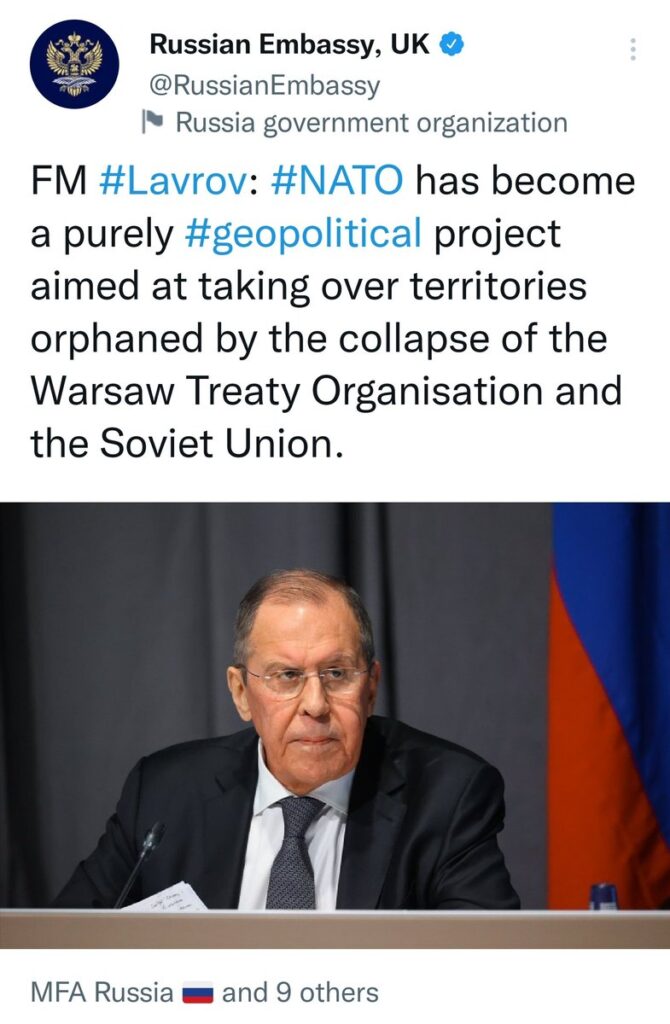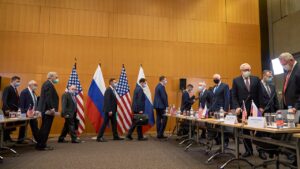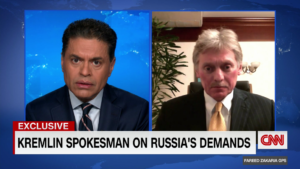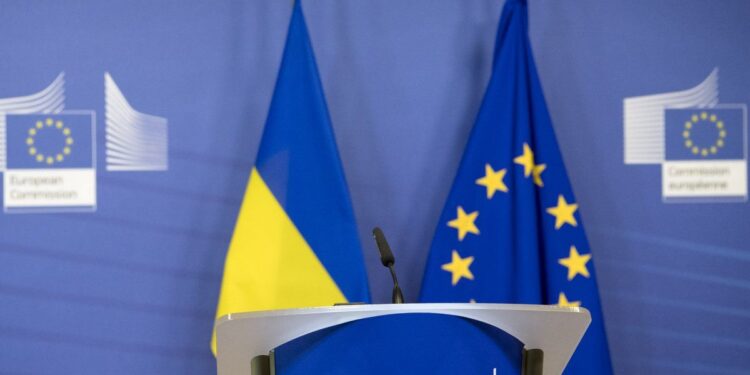by Miceál O’Hurley
WASHINGTON, D.C. – Contrary to popular thought, Putin’s objection to NATO on Russia’s borders is driven by a fear of Western forces or weapon systems. Over-the-horizon weapons and advanced technology have almost eliminated the tactical need for such close proximity. Putin and his Russian Federation fear independent, free and functional States on their border, capable of demonstrating self-determination and offering a stark alternative to the failed-State Putin has created and sustains with the threat of nuclear weapons and military might.
Successful democracies, imbued with NATO and European shared-values, thriving on the Russia border, is what keeps Putin awake at night.
Russian World-View is Narcissistic and Myopic, Incapable of Seeing Their Causality in NATO’s Growth
Amidst the firestorm of concerns set-off by Russia’s most recent round of aggression is its penchant for hybrid-warfare. From its escalation on social media to use of RT and other media outlets for interviews and press conferences laden with misinformation and outright lies, Russia continues to spew false information which knowingly disfigures facts and the truth about recent history in the hopes of destroying European unity. This disinformation and misinformation onslaught has been accompanied by an overtly muscular military deployment which poses an immediate, existential threat to Ukraine. Given Russian Federation President Vladimir Putin’s long and rambling July 2021 essay he entitled “On the Historical Unity of Russians and Ukrainians,” in which he claims virtually all Eastern European and the Baltic peoples are at their core Russian (a claim buoyed by his continued twisting of history so that he could arrive at that absurd assertion), was a blatant apologetic for his plans of conquest of free, European nations.

This myopic world view was re-asserted as late as last Monday when Russian Federation Foreign Minister Sergey Lavrov referred to free, independent and sovereign States like Lithuania, Latvia, Poland and Ukraine as being mere “territories orphaned by the collapse” of the Soviet Union. Lavrov’s specific use of “territories” is as ominous as it is instrumental to understanding the Russian mindset. Their latest round of demands from NATO, to return it to its 1997 membership status, is a hubris-driven, over-reach that would not only exclude Ukraine and Georgia from future NATO membership but necessitate NATO expelling Albania, Bulgaria, Czechia, Croatia, Estonia, Hungry, Latvia, Lithuania, North Macedonia, Poland, Romania, Slovakia and Slovenia from their membership. One would think Russia would understand this is why U.S. Secretary of State Anthony Blinken has called the demand a “Non-Starter”. However, recalling Putin’s claim that Ukrainians and Russians are one-people, and Lavrov’s assertion that these sovereign States were merely Russian “territories,” it becomes painfully clear the world is negotiating with a partner where a meeting-of-the-minds on fundamental ideas of freedom, international law and sovereignty simply does not exist. Russia, which has in many ways isolated itself due to its unceasing litany of bad-acts in Europe, from invasions and occupations to murders and manipulating the gas supply to threaten the continent, seems to have fallen prey to the danger of living in an echo-chamber such that it has come to believe its own propaganda without critical reflection about it being the causal factor in its neighbours seeking NATO membership to defend themselves from demonstrated Russian aggression, invasion, occupation and threats of more of the same.
Mutual Understanding – The Basis of Negotiation is Reduces Negotiations to a Russian Monologue
In an exercise I used to employ to illustrate how people looking at the same problem can have diametrically opposing views of how to interpret it, I used to ask my Conflict Resolution students to divide the following letters into words: godisnowhere.

It is important to note that all of the students saw the same letters in a single grouping at the same time, without discussion with each other. The students, depending on their backgrounds and education, would invariably divide the same English letters into two contrasting word groups: god/is/now/here or, alternatively, god/is/nowhere.
Through this exercise I hoped to bring home to my students how two sophisticated parties can see the very same thing and yet draw entirely different conclusions. Consequently, if negotiations were to continue without first resolving the fundamental issue of common understanding of the problem negotiations may continue, but they will not necessarily progress and may be doomed to failure either in exploring resolution models or that if a ‘solution‘ is reached, it will prove durable given the lack of mutual understanding of the very same thing.
A first-year law student who slept through their Contracts course could tell you, “Where there is no meeting-of-the-minds there can be no agreement and therefore no enforceability or durability could arise from such negotiations”. Until Russia is willing to acknowledge that their neighbours are free, independent and sovereign States that merit the protections of international law, which includes self-determination, there is little use in negotiating with Russia. Russia’s only concern is that their demands, unreasoned though they may be, are met. Last weeks three meetings in Geneva proved not to be a dialogue, but a monologue, with Russia stating its demands which they claim were not heard and the U.S., NATO and OSCE reiterating that Russia has no veto over the decisions of sovereign States concerning NATO membership and there would be severe consequences if Russia acted upon its threats.
Parties at the Table
Although Russia asked for last week’s meeting in a bilateral format between themselves and the U.S., it appears that the wrong parties are at the table, or more correctly, one party is not fully constituted at the table. This is fundamentally a European issue. the EU/EC, Europe’s largest cooperative stakeholder, however, is not fully at the table in the negotiations to date. The placement of the U.S. as the first and paramount player for negotiations about Ukraine, its future and security plays cleverly into Russia’s hand. Russia has continually blamed the Maidan Revolution which saw-off the corrupt, anti-democratic Ukrainian President Viktor Yanokovich who fled into the arms of his Russian masters as the construct of the U.S. This again negates the truth that Yanukovych stood against the Ukraine’s will to enshrine future E.U. membership into their Constitution by the democratic resolve of the will of the people and their elected parliament, the Verkhovna Rada. The U.S., although a stalwart ally of Ukraine, remains a Transatlantic partner in this matter and aside from their direct engagement in NATO, not a direct stakeholder in the dispute. Indeed, last week’s dialogue with Russia seemed more about U.S.-Russian bilateral strategic arms rather than the immediate issue – Ukraine’s security.

If the U.S. is to make good on President Joe Biden’s promise to act more multilaterally it might prove useful for the U.S. to participate in negotiations with Russia at this time through NATO rather than acting as a separate partner. By doing so, the U.S. can still fully assert their willingness and steadfast resolve to support Ukraine with more defensive weapons and technical assistance all while allowing its inherent weaknesses displayed during the erratic Trump years to not become part of the negotiations. The EU/EC, NATO and OSCE would then be free to pursue negotiations with Russia free of accusations of being American pawns and demonstrate that Europe can stand united against despotism and aggression without a Transatlantic giant overshadowing European affairs. Such a move by the Biden Administration would be consistent with its rhetoric about being a multilateral player with its partners though history would indicate that the likelihood of this happening to be limited. It would also be welcome in many European capitals of a sign that the U.S. no longer seeks to act the “policeman of the world” and allow its mature democracy partners to demonstrate the change in times and international policy since the World Wars of the 20th century. For as long as the U.S. continues to be the lead party at the table Russia will use this as both a wedge to be driven between the U.S. and its European allies and simultaneously widen the negotiations beyond the European forum where it essentially belongs.
Russia Unilaterally Widens and Escalates Threats Across Europe
Despite its myopathy, Russia is aware their demands could not possibly be conceded by the West and therefore paired their “non-starter” demands with not only a monstrous attack force marshalled on Ukraine’s border but are employing both hybrid and cyber warfare in an attempt to gain leverage over the West by threat of war – a threat they have unilaterally created and sustain. The attack upon Poland’s air force computers and Ukraine’s government ministries last week in the context of the troops staged to threaten an invasion of Ukraine are clearly belligerent acts meant to be cloaked in plausible deniability. Nobody has been fooled by whom such attacked were launched, even if proxies were used.
Microsoft’s detection of sleeping malware has infiltrated these networks, so the culprit(s) could turn these critical computers into a ‘brick’ at any moment, figures largely into general destabilisation and specific preparation for external ground combat operations on the part of Russia. The detection of Russian-made drones flying over Sweden’s nuclear power plants and critical infrastructure at the weekend was also paired with bellicose threats from Russia warning both Sweden and Finland from drawing closer to NATO. There seems to be no end to Russia’s continuing threats to their neighbours, all while claiming they are victims of NATO encroachment (See Peskov interview, below).
Finland’s President, Sauli Niinisto, and the Prime Minister, Sanna Marin, used their annual New Year speeches to the nation to reaffirm that notwithstanding Russian threats, Finland reserves the right to seek NATO membership at their will. “Let it be stated once again: Finland’s room to manoeuvre and freedom of choice also include the possibility of military alignment and of applying for NATO membership, should we ourselves so decide,” said Niinisto. In her speech, Marin reiterated the point, “We have shown that we have learnt from the past. We will not let go of our room for manoeuvre.” The Russian Federation Foreign Ministry responded that Finland and Sweden joining NATO “would have serious military and political consequences that would require an adequate response from the Russian side”. This is not merely a Russian-Ukrainian issue but one in which Russia has engulfed all of Europe with threats of use of force.
Having laid claim to Ukraine, the Baltics and other former Soviet Republics in Putin’s essay claiming they are essentially Russians, furthered by Lavrov’s declaration that the Kremlin sees their neighbours as mere “territories”, combined with their invasion and occupations in Moldova, Georgia and Ukraine – Russia seems determined to give proof to Karl von Clauswitz’s axiom, “War is an extension of Government policy by other means.”
With Russia’s stated policy that it desires to re-assemble the former USSR, and its diminution of sovereign neighbour States to be trifling “territories orphaned” by Russia when the USSR collapsed, the West must take seriously Russia’s willingness to use warfare to achieve such a goal and dismiss Russia’s unconvincing claim it has “no intention of invading Ukraine“.
Diatribe of Misinformation and Lies from Putin Confidant and Kremlin Spokesperson, Dmytri Peskov
To make things poignantly clear, Dmitry Peskov, Putin’s lapdog-spokesperson for the past 20-years, appeared last weekend on the popular U.S. television news programme, CNN’s Fareed Zacharia GPS. Peskov’s words are well worth parsing [excerpts from interview below]:
PESKOV: Well, you know, it started with the beginning of the '90s when Germany was reunited and when the then Soviet Union and the Soviet Union leader Mr. Gorbachev said OK to that, there was a promise by American side. Unfortunately not fixed in a judicial legally binding guaranteed document, but there was a guarantee that NATO would never -- would never expand its military infrastructure or political infrastructure eastwards. Unfortunately, the opposite thing started to happen since then.
Germany wasn’t reunited because Gorbachev and the USSR said “OK”. It was reunited because the German people demanded it, as was their sovereign right.
NATO gave no such guarantee. Russia repeatedly claims the force of law when it suits them. However, Peskov is aware of the legal principles developed since Roman times that contracts depend on not only what is said, but what external signs (actions) are taken in furtherance of the supposed agreement are what is important. At no point over the past 3-decades did NATO agree to close its membership for former USSR Republics. Russia, therefore, could have no realistic belief that NATO ever agreed to “never expand its military infrastructure or political infrastructure eastwards”. Any ex nihilo claim of such a promise is not only self-serving, but an attempt to shift blame to NATO for the current standoff so as to deny Russian culpability due to years of belligerent conduct on their part.
And NATO's military infrastructure started to get closer and closer to the borders of the Russian federation. The United States started to deploy different weapons, different launching systems and so on and so forth, closer to our border with each year. This all led to the situation when we started to feel endangered by that and our nation of security was endangered. So what you have mentioned is not a story of the last couple of months or couple of weeks. It's a story of a couple of decades, a couple of decades when NATO -- and by the way, NATO is, in our understanding, it's an organization that was tailored and was created for confrontation, not for defense. And NATO is not a dove of peace and not a dove of stability. And not a dove of prosperity.
NATO had the right to admit members who seek admission to NATO based upon its own requirements. That Albania, Bulgaria, Czechia, Croatia, Estonia, Hungry, Latvia, Lithuania, North Macedonia, Poland, Romania, Slovakia and Slovenia all felt the need to seek membership in a collective, defensive organisation since 1997 specifically because they understood the genuine, enduring threat the Russian Federation continued to pose to them is a direct result of Russia’s history, policies and actions and not a reflection of any desire by NATO or the U.S. to threaten or invade Russia.

Russia’s paranoia is pathological in its enormity. Peskov’s view of NATO, which is Putin’s view and therefore Russia’s view of NATO, rests upon “our [Russian] understanding”. That understanding is unique coming from a Russia that collaborated with Hitler to start World War II through the Ribbentrop-Molotov Pact, signed in Stalin’s very presence, designed for the two belligerents to cooperate in diving-up the sovereign States around them only to then claim. Russia’s later claims they were victims of Nazi aggression when their own partners-in-crime turned upon them (a view repeatedly reinforced by Putin) is simply lacking in credibility. Unlike the Russian Federation where the economy is barely functional and the standard of living and life-span is declining, NATO has been at the centre of a stable Europe. NATO has been instrumental in breaking the centuries-old cycle of Europeans attacking each other. No European nation has attacked and occupied the other since NATO’s establishment – that is with the exception of Russia attacking and occupying its neighbours in Moldova, Georgia and Ukraine, and, according to a German Court in December, the Russian State ordering the extra-judicial murder of people on European soil as it is also suspected of doing in the U.K. and elsewhere in Europe to cower opponents, eliminate journalists’ criticism and quash democratic movements. Russia, not NATO is the author of confrontation since World War II.
NATO is a weapon of confrontation. And this weapon of confrontation with each year started to get closer and closer to our borders. And with the -- after 2014 when a coup happened in Ukraine, Ukraine started and Ukraine actually has said that it would be oriented more closer to NATO membership. At first they were just words, but with the time being, we have seen the gradual invasion of NATO into Ukrainian territory with its infrastructure, with its instructors, with supplies of defensive and offensive weapons, teaching Ukrainian military, and so on and so forth. And that brought us to the red line. That brought us to the situation when we -- well, we couldn't tolerate it anymore and that was the main reason for President Putin to say, guys, this is a real threat for us and this is a real threat for stability and security in European architecture. Let's find a way out. Let's produce some guarantees for us. Let's think about returning NATO's military infrastructure back to the borders of 1997. Let's get freed of the idea of Ukrainians membership to NATO and also let's get rid of the idea, let's abandon the idea of deployment of any offensive weapons on the territory of Ukraine next to our borders. This was the main idea, the main proposal of President Putin. So we are quite a big country, and we're too big and we're too important to keep silent against this danger. So that was the main reason.
The very idea that Putin and his Russia, who were instrumental in destabilising Europe with the invasions and occupations of Moldova, Georgia and Ukraine (not to mention poisonings, murders, disappearances and jailing of critics, killing and detention of journalists and political opponents) is concerned about the “stability and security in European architecture” would be laughable if it weren’t delusional. As for “… the gradual invasion of NATO into Ukrainian territory….” again, an invitation by Ukraine for their friends and allies to assist them in defending from the actual Russian invasions in Donbas and Crimea can hardly be characterised as an “invasion”. Let’s be abundantly clear – Russia, not NATO, is the invader and, as Ukraine is not a NATO member, Russia’s occupation of Modlova, Georgia, Donbas and Crimea moved Russia’s military and political presence closer to Europe, not the other way around.
PESKOV: Well, there is also space for compromise, excluding some principal concerns. And here we're talking about principal concerns. Russian has never had the deficit of political will for negotiations. To the contrary, President Putin was willing, was willing all the time and he is willing negotiations with NATO, with the United States, based on the mutual respect and readiness to take into account each other's concerns. So NATO -- you're talking about open-doors policy for Ukraine, but you cannot create a security of one country at the expense of the security of the other. So there is an understanding of instability of security. And it's extremely important, extremely important. And we have to find out a combination to solve this problem taking into account concerns of Russia. We don't know what the outcome is going to be. We have these three sessions of negotiations.
And there you have it! Peskov’s assertion, “… you cannot create a security of one country at the expense of the security of the other” is as striking as it is galling. Russia’s demand that Ukraine be re-integrated with Russia for security reasons and that NATO be rolled-back to its 1997 membership to guarantee Russia’s security would necessarily, and by definition, come at the security expense of all of its neighbours. The lunacy of such a demand, said with a straight face to a world-wide audience, raises serious concerns about the ability to successfully reason or negotiate with Russia given this paranoia driven delusion.
PESKOV: So we have Russian peacekeepers in various regions and in those regions situation is still very fresh, is still very, very fragile and potentially the withdrawal of Russians can lead to inflammation of new crisis. We don't know what can be the outcome and what can be the situation with Abkhazia or with Ossetia, for example. And people of Abkhazia and Ossetia can be endangered by Georgia nationalists like it's happened when Georgia unleashed a war against Ossetia sending tanks against a peaceful population. You have to remember it.
OK. Wow. Talk about re-writing history! The hubris of calling Russian forces and their hirelings in Abkhazia, Ossetia and Donbas “peace keepers” is astonishing. As the Grand Chamber of the European Court of Human Rights (UCHR) decided in the Georgia v. Russia (II) judgment, Russia is in effective control in Georgia and is responsible for human rights violations that occur under their “occupation”. Russians therefore cannot be considered “peacekeepers” any more than the Russian, . And Russia will never discuss with anyone withdrawal of any missiles and any weapons from Kaliningrad because Kaliningrad is a territory of Russia. And with all the due respect, we will never tolerate any demands for us to do this or that on our own territory. None of the countries will tolerate.
ZAKARIA: What about from Ukraine's territory? What about de-escalation in Ukraine? PESKOV: Yes, de-escalation in Ukraine. Well, first of all, there are no Russian troops in Ukraine. There are no Russian troops in Donbass. There are Russian troops on the Russian soil, on the Russian territory next to Ukrainian border. It's quite understandable. ZAKARIA: You know international observers say that there are Russian troops not wearing Russian uniforms but there are Russian troops in Donbass. PESKOV: There are no Russian troops in Donbas. I'm a spokesperson to Kremlin and I officially can tell you that there are no Russian troops in Donbass and on Ukrainian soil.
Nobody, but nobody, believes there are no Russia troops in Donbas. Such an assertion says everything one needs to know about the lack of integrity with which the very highest level of power in Russia deals with the world. i would recount proofs of Russia’s presence as aggressor forces but that would take up too much ink to state the obvious in this article.
PESKOV: Well, we're not speaking about military action. This is -- you have to understand, no one is threatening anyone with military action. This will be just a madness to do that. But we will be ready to take counteractions. So if you continue to say that, listen, Russians, we're not going to take into account your concerns, NATO will continue to expand, now we're not going to have Ukraine's side, NATO, but for the time being legally it will be possible, we're not going to say that we will not deploy any offensive weapons on Ukraine's territory and NATO's military infrastructure will stay next to your border and we will even for the time being get even closer. If you tell us that, we will have to do something. What is the timeline? What is the timeline? Well, of course, we're not speaking about tomorrow. We're not speaking about hours, but what was meant by our President is that we don't want to see a process for the sake of the process. So we don't want to see a month-long or yearlong negotiation discussing our disagreements. We want to feel for the beginning the readiness to take into account our concerns. Right now unfortunately we fail to do that.
”No one is threatening anyone with military action,”? Really. 100,000 trooops massed on Ukraine’s border for the second time in six-months and this is not supposed to be a threat? Putin, Lavrov and Deputy Foreign Ministery Dmitry Ryabkov saying Russia is prepared to take “military-technical measures” if it continues to feel threatened is not a threat? Again, Russia’s paranoia in feeling threatened by its neighbours taking sane, measured, lawful and reasonable defensive measures in light of Russia’s invasions and occupations in Moldova, Georgia and Ukraine is the epitome of Russia’s national Munchausen syndrome.
PESKOV: Well, I understand that Washington is -- is a great fan of introducing sanctions against different countries. And what was meant for the last -- for the last kind of sanctions, this -- even sanctions, mentioning sanctions against the leadership of Russia, well, of course, it's beyond -- beyond our understanding.
Let’s get this straight. Russia defies its pledges made in the Budapest Memorandum to not only respect but defend Ukraine’s territorial integrity, disregards its obligations in international law, breaches its undertakings to the U.N. Charter and kills over 14,000 Ukrainians through occupying Ukraine’s Donbas and Crimea through violent means, doing the same in Moldova and Georgia, and Russia still has the audacity to claim sanctions by the U.S., U.K., Canada, EU and UN are “beyond our understanding”? It defies credulity.
China Watches Europe’s Willingness to Stand Up for Its Values
China is watching developments between Russia and Europe with great interest. How much Putin gets away with, and what concessions the West is willing to make owing to his threats, will no doubt inform China’s future steps in the South China Seas and Taiwan. Unless the world wants to fall into another endless and ever-widening cascade of conflicts, with sovereign nations being erased from the map by aggressors whose calculus shows they can benefit from the West’s lack of real unity and squeamishness about standing-up to despots, a repetition of the death-by-a-thousand-cuts that led to the rise of fascism, national socialism and communism in the last century is bound to repeat itself. It is time for real resolve to be shown and not simply continue to reward threats, belligerence and illegality in the never ending pursuit of peace that only sees more and more people across the globe slip into the hands of authoritarian regimes for whom gunboat diplomacy has proven a useful tool.
Democracy and freedom are in noticeable decline worldwide not because the values of nations that embrace those values and abide by a rules-based-world-order don’t offer something superior to despotism, authoritarianism and aggression but because the West has stood too silent, for too long, and too many times in the face of such challenges by those who confuse power for authority and duress for submission.

Is Ukraine Worth the Risk?
As for Ukraine’s security and future? That may depend on Europe’s resolve not only to see Ukraine from to exercise self-determination, but for Europe to remain free to live out its founding vision and retain the right to keep its doors open. If Russia gets its way with NATO, it consequently limits the EU’s ability to live out its vaunted values.
If Russia is allowed to profit from these antics it will render the European dream dead even if the experiment lives on at the expense of those left to be subjugated by Russian dictates.
In the final analysis, it is instructive to recall that if memory serves me correctly, the only people we have seen die in the struggle for freedom and democracy while wrapped in the European Union Flag were Ukrainians who lost their lives demonstrating for the right of self-determination to nourish the hope of being part of the European experiment in democracy, freedom and humanity that is embodied by the European Union.
If we hope for democracy to thrive and Europe to be free to make its own decisions on its future, it must stand with Ukraine now.
















































